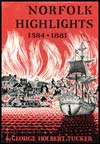Chapter 20
The Press of a Patriot
Norfolk's first newspaper, the Virginia Gazette, or Norfolk Intelligencer, had a brief but memorable existance. Its first issue appeared on June 9, 1774, and what is believed to have been its last issue left the press on September 27, 1775.
The four-page weekly, the only known copies of which are preserved in the Library of Congress, was first published by William S. Duncan & Company, whose printing office was on the east side of the Parade or Market Square, later known as Commercial Place.
In April of 1775, John Hunter Holt became its publisher and the firm's name was changed to John H. Holt & Company. Holt, an ardent patriot and a son of John Holt, the public printer in Williamsburg, continued to issue the paper until it was suppressed late in September of 1775 by Lord Dunmore, the last royal governor of Virginia.
Because of mounting resistance to his arbitrary actions on the part of Virginia patriots, Dunmore had fled from Williamsburg in June of 1775 to the safety of the British warships in Norfolk-area waters. And as Norfolk had a large Tory element, he had made its harbor the base of his operations. This gave Holt his cue, and his paper began a steady, merciless needling of the unpopular governor.
Matters came to a head when Holt's paper of September 27, 1775, presumably contained several pointed reflections on the alleged treasonous actions on the part of Dunmore's father in the Jacobite Rebellion under Bonnie Prince Charlie in 1745. This and other taunts spurred Dunmore into action. And at noon on Saturday, September 30, 1775, he sent an officer and a detachment of British sailors and soldiers ashore to "the dirty little Borough of Norfolk" to confiscate Holt's press and printing materials and to capture Holt if possible.
Meeting no resistance, the landing party marched to the printing shop and seized Holt's "press, tipes, paper, ink, two of the printers, and all of the utensils." Holt's bookbinder, a man named Cumming, was also taken prisoner, but Holt, who according to one account of the fracas was hiding in the building, was not captured.
The raid was witnessed by several hundred persons, but apparently no one seemed inclined to do anything about the high-handed action. And after the landing party, with its loot and prisoners, returned to the boats, the onlookers were "joined by a crowd of negroes" in three loud huzzas.
The account containing this comment, dated Norfolk, September 30, 1775, continues: "A few spirited gentlemen in Norfolk, justly incensed at so flagrant a breach of good order and the Constitution, and highly resenting the conduct of Lord Dunmore and the navy gentry, who have now commenced downright pirates and banditti, ordered the drum to beat to arms, but were joined by few or none; so that it appears Norfolk is at present a very insecure place for the life or property of any individual, and is consequently deserted daily by numbers of the inhabitants, with their effects."
Immediately after the raid, Norfolk Mayor Paul Loyall protested that it was "illegal and riotous", but Dunmore, who had watched the incident through a spyglass from one of his ships, arrogantly told Loyall that he had done Norfolk a favor by "scotching the printed viper that was pouring its poison in their midst."
Dunmore's seizure of Holt's press caused a hue and cry, and the Williamsburg papers stepped up their campaign against him, even alleging that he had "dared offer violence to the chastity of a poor innocent girl" from the Norfolk Poor House and had also kept a mistress while he was in Williamsburg. But that didn't effect the return of Holt's press, which was used by Dunmore to print a short-lived paper of his own aboard one of the ships.
Holt retaliated by announcing that he would set up another press in Norfolk, but this was prevented by the burning of the borough a few months later. Holt then joined the Revolutionary Army, and after Yorktown he was associated with John Dixon in publishing the Richmond Virginia Gazette and Independent Chronicle. He died in 1787.
Chapter
21
Methodism in Early Norfolk
Norfolk Highlights 1584 - 1881

See the "Table of Contents" for links to every chapter in Norfolk Highlights 1584 - 1881 by George Holbert Tucker.
